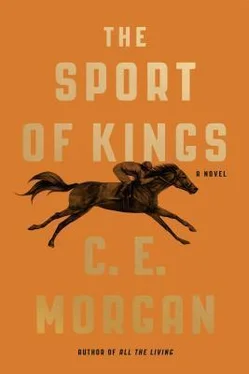* * *
Down behind their building, down the shaft of the back stairwell was the cement garden, the hollow heart of the turn-of-the-century tenements that formed their block. The buildings towered forty feet high on every side and made a shady grove where the neighborhood girls played in the summertime. A Rottweiler lay chained in one corner, snoring with its caramel chin on its paws. Girls streamed from the building every morning — one always climbing out through her kitchen window — to argue and dance and scream and double Dutch, but retreated from the noon sun that heated the cement to a skillet, because once a turner had suddenly dropped her ropes, her head lolling like a bobblehead before she pitched face-first to the ground, and she still had the scabbed cheek to prove it. At noon, the girls huddled beneath a lintel and sucked on orange popsicles until the two o’clock shadows canted across their playground, and play resumed.
Allmon maintained a blinkless vigil from their second-story window for many months before he found the courage to creep out of the building to the cement garden. Even then, he was seized with a reserve so crippling that he simply stood on the doorjamb, gazing at the girls through the veil of his lashes. They were jumping and singing and calling while a girl skipped through the lines, her hands perched on her lean hips, her beads up and down and clacking. As Allmon watched, a tiny bunch of foil fell and two beads sailed off and spun away on the cement.
“Your hair! Your hair!” the girls cried, and the jumper leaped out of the eggbeater, her hands to her head, and spotted the boy. Two fingers pinching the braid tight, she cried, “The baby!”
“The baby!” Seven girls, all sweat and brightness and exhilarated jostling, pressed in toward him, though he hung back in a shy twist of limbs. The beadless girl was the first at his side, smiling down and petting him on the head as if he were a sweet dog.
“He has a face just like an old man,” she said as she inspected the preternaturally heavy brow, the knife-jut cheekbones, the hollow cheeks.
“Danelle, why you always talk so white?”
“I don’t!” the girl cried, wounded, whipping around.
“Yeah, you do!” in a chorus. They were circling him now, or her.
“Danelle wanna be white!”
“I don’t!”
“Danelle wanna—”
“Shut up and make the baby jump,” another girl interrupted, stepping forward, their tall, unspoken leader. She still held the end of the fallen ropes in her hands.
“I ain’t no baby,” Allmon said.
“You got a white daddy?” someone asked, and eyes all swerved to him again.
Allmon’s tongue was suddenly confused.
“I heard you got a white daddy!”
“Are you white?”
In the middle of those arms and legs and cocked heads, the lie was pure instinct. “My daddy black.”
“I wanna white daddy,” someone said.
“Naw, you don’t. White people don’t use no washcloths.”
The girl petting Allmon narrowed her eyes. “Is your daddy really black?” she asked, but Allmon, under the impress of her hand, could only nod.
“Jump, jump!” someone cried, and they took up the chorus and then they were reforming and slinging a single rope. He stepped forward — a muscular little boy in a ragged white undershirt, his hair poufed slightly out of form from soft neglect.
“I like coffee, I like tea,” they sang, “I like the baby boy to jump with me. Double Dutch!” Both ropes rasped now in duple. Allmon’s little knees pumped, his hands splayed, his face was angry with concentration. A shadow of cloud swept their playground and the turner — who bobbed her head with the rhythm of the ropes, her little pink tongue caught between her pressed lips — looked up. Allmon judged the descent of the rope and faked a hop and went down with a thud and a false “Ow!” and rolled on his back for the welcome, his arms wide.
They were on him. Oh, they laid their bodies over his and took his face in their hands and kissed on him, their breath hot and their mouths sticky.
“Allmon!”
The girls sprang back from his prone body and there, silhouetted against the sky, was Marie, leaning precipitously from their kitchen window, calling down, “Don’t you all molest my child!” The girls just studied the ground, and then one in their midst said, “Ain’t nobody molested nobody,” and Marie leaned even further out the window, so that she looked near to tumbling out, saying, “That wasn’t you on top of my boy? That child is four years old! Don’t put your greasy little hands on my boy’s business.” Someone tittered. Then Marie yelled, “Turkey vultures!” and the girls evaporated, fleeing into the shadows. But when Allmon looked up, Marie was smiling. “Get on up here,” she said. “I’ve got good news for you.”
Marie was crouched to his height when he ran into the apartment. She was grinning, and her dimples were deep enough to fit a thumb. “Guess what?”
“What?” he said, shy of surprises.
“Daddy’s coming to visit and y’all are going to the Northside carnival!”
“Ah!” he screeched, and would have run, but she snatched him to her, lifted him against her chest.
“Listen now,” she said into his ear. “You know how long it’s been since your daddy was up here? Oh God,” she said. “Forever. Forever. But he’s coming back. So I’m begging you. Allmon, your momma is begging you. You need to get some good behavior and be on it, be my little lamb, because—”
Allmon watched her face grow grave.
“—I need this family,” she said, barely above a whisper. “That man’s got my heart in his body. So just be good is all I’m asking. If we stay on our best behavior, maybe we can get him to stay a while.” With gentle hands now, Marie returned him to the ground, lifted his chin with a thumb, and said, “Be my best.”
“He be gonna stay?” he said, and the openness of his face, and the uninsured hope she saw there, caused her heart to stop. But all she said was, “Quit that baby talk, Allmon.”
* * *
He came on a Friday morning, bounding up the stairs with an enormous box in his hands, a box that contained a new, stainless steel cook set. Marie was preparing for work, but she stopped rummaging in her purse when he walked in with the late-summer air around him and pressed herself against the length of his body. Allmon could barely manage his joy. This man’s face, so wondrous after a long absence, brought the mystery of his beginnings. He wedged himself between his parents’ bodies.
“Now, I’ll be back at five,” Marie said, and, with a finger against his father’s chest, asked, “Want me to bring you dinner?”
“Yeah,” Mike said, shrugging. “Bring me something from the Fifth Amendment.”
“A pastrami sandwich? I know how you like that.”
He made a face and rolled his eyes. “Naw. Bring me a burger. I’m tired of that pastrami shit.” He looked down at Allmon, grinning crookedly and reaching for his cigarettes. “You tell somebody that you like pastrami, then — bam! — it’s pastrami all the time till you can’t stand the smell of it. God, woman.” He laughed, the tiniest dart of a glance in her direction. His long, straggly hair was gathered back in a ponytail to reveal his freckled cheekbones, stark from underweight.
“Now, Allmon gets a snack at ten and then—”
“I know, Marie.”
She smiled. “I know you know. I’ll shut up.” She kissed him, and he offered her his stubbly cheek.
“Have fun,” she said. “Be good…” A pointed glance in Allmon’s direction and then she was gone.
“Well,” said Mike, and he heaved his skinny shoulders up and down once, glancing around the sunny room. He made his way to the couch, but had only stretched out for a moment, not bothering to remove his shoes, when he perked up his head above the backrest and said, “Allmon, lock the door.” And Allmon, excited, watchful, dutiful, dragged a kitchen chair to the door, clambered atop it, and turned the latch. Then he turned around on the chair with his hands behind his back, grinning.
Читать дальше
Конец ознакомительного отрывка
Купить книгу












